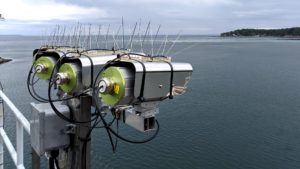WOODS HOLE – An increase in vessel traffic through the Gulf Islands in British Columbia, Canada is making whales more vulnerable to ship strikes, and researchers from the Woods Hole Oceanographic Institution are testing new technology to detect the presence of the marine mammals.
To help mitigate potential collisions, Dan Zitterbart, an assistant scientist at WHOI, is working with British Columbia Ferry Services, Inc. and Transport Canada to install and test thermal infrared cameras to monitor inlets for whales.
Zitterbart received a 2019 Young Investigator Program award from the Office of Naval Research for his work in developing next-generation whale detection systems.
The cameras are being installed at a ferry terminal on Galiano Island on a test basis and will scan the mile-wide Active Pass for whale blows for at least the next year.
Thermal cameras detect the mammals by measuring the apparent temperature differences between the whales and the surrounding water and air when they surface and exhale. The technology also works independent of daylight, unlike other detection methods such as observation from planes and boats.
For the cameras to be reliable, it is important that they will be able to differentiate between whales and boats in a congested channel.
They are linked to a computer running in the background that has been “trained” on model images of vessels and whales. The models help minimize the number of falsely-identified “whales” that are reported by the cameras.
Acoustic monitoring is already used in the narrow waterway and adding optical whale surveillance is another proactive step that may help reduce the risk of a possible strike even further.
Dense fog and rainfall can impair the accuracy of the cameras.
If the initial testing is successful, Zitterbart may try expanding the application.
“This work is only one part of the overall solution to preventing vessel strikes,” he said. “But if the detection is effective enough, we could eventually think about mounting infrared cameras directly on the bow of ferry ships and having a real-time feedback loop where mariners are alerted to slow down if whales are present.”

























